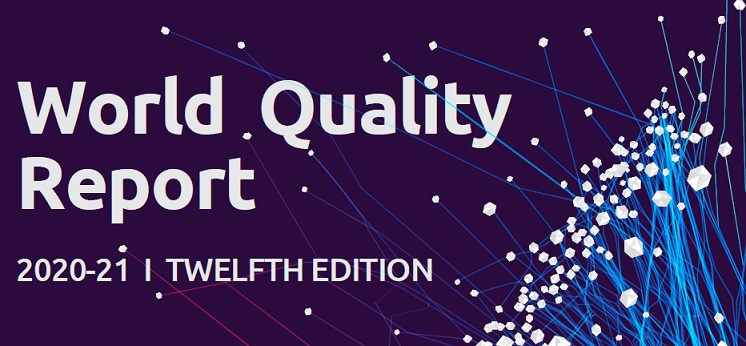Amazon Web Services (AWS) announced the general availability of Amazon Q, a generative artificial intelligence (AI)-powered assistant for accelerating software development and leveraging companies’ internal data.
Quality assurance (QA) is steadily evolving from a backroom discipline to an integral part of wider enterprise digital transformation, according to the World Quality Report 2020-21 (WQR) from Capgemini, Sogeti, and Micro Focus.

Contributing to business growth and business outcomes was the highest rated objective for testing and QA at 74% — up 6 percentage points from 2018.
The WQR 2020 highlights that expectations from QA have been increasing with an upward trend across various strategic objectives including the need for QA to support business growth and the importance of ensuring end-user satisfaction.
There has been steady and promising progress hindered only slightly by recurring struggles, also noted in previous editions, that include skill gaps and getting a return on investment on test automation.
Adoption of agile and DevOps increasing
In line with the trend observed in the last two years, this year too saw an acceleration in the adoption of Agile and DevOps methodologies.
While there is a marked focus in increasing the level of test automation and shifting testing to the left using Agile and DevOps, achieving higher levels of in-sprint automation and lack of expertise within the QA team to achieve the desired objectives remain challenging.
High expectations for AI and ML
The uptake of artificial intelligence (AI) and machine learning (ML) in QA has also increased.
88% of respondents said that AI was now the strongest growth area of their test activities, and 86% consider AI a key criterion for selecting new QA solutions.
Even though the benefits may not yet be fully in reach, the vast majority are enthusiastic about the prospects for AI and ML.
The greatest challenge in applying AI and ML in QA was identified as skill gaps, mentioned by 34% of respondents (down two percentage points from last year).
Test automation: Organizations working to control QA activities
Previous World Quality Reports have consistently shown challenges in the test automation arena. In achieving quality assurance to a professional’s desired level of test automation, the most common challenge in 2019 was the frequency with which applications were changing. In previous years, the lack of people with sufficient specialist skills and experience within test automation was highlighted.
In the 2020 survey organizations expressed a degree of confidence when they were asked for their views on various aspects of test automation: 68% said they have the required automation tools while 63% have enough time to automate tests.
However, despite these promising statistics, only 37% felt they get a return on that investment, indicating a gap between confidence and results.
COVID-19 and QA
As a result of the pandemic, 47% of respondents said there would be significantly greater focus on customer experience validation and on usability testing.
Meanwhile, 43% of respondents said that the focus on more and better collaboration tools will go up, and 34% said they will need more remote access to test systems and test environments.
There have also been COVID-19-related QA implications around security: 83% of CIOs and IT directors said their application security concerns have increased over the past 12 months, likely a result of the move to a remote working world.
"Despite the challenges brought about by COVID-19 it’s been a promising year for orchestration and quality assurance in the enterprise," says Mark Buenen, Global Leader of Digital Assurance and Quality Engineering Services at Capgemini Group. "In fact, COVID-19 has acted as an accelerator for QA, demonstrating its integral importance to operations. It’s encouraging to see that QA professionals are optimistic about their testing capabilities. However, as the findings show, this optimism does not always match up to results. By relying more on cloud infrastructure and progressing further with AI for QA, these teams will be able to work faster, smarter and have greater business impact."
Industry News
Red Hat announced the general availability of Red Hat Enterprise Linux 9.4, the latest version of the enterprise Linux platform.
ActiveState unveiled Get Current, Stay Current (GCSC) – a continuous code refactoring service that deals with breaking changes so enterprises can stay current with the pace of open source.
Lineaje released Open-Source Manager (OSM), a solution to bring transparency to open-source software components in applications and proactively manage and mitigate associated risks.
Synopsys announced the availability of Polaris Assist, an AI-powered application security assistant on the Synopsys Polaris Software Integrity Platform®.
Backslash Security announced the findings of its GPT-4 developer simulation exercise, designed and conducted by the Backslash Research Team, to identify security issues associated with LLM-generated code. The Backslash platform offers several core capabilities that address growing security concerns around AI-generated code, including open source code reachability analysis and phantom package visibility capabilities.
Azul announced that Azul Intelligence Cloud, Azul’s cloud analytics solution -- which provides actionable intelligence from production Java runtime data to dramatically boost developer productivity -- now supports Oracle JDK and any OpenJDK-based JVM (Java Virtual Machine) from any vendor or distribution.
F5 announced new security offerings: F5 Distributed Cloud Services Web Application Scanning, BIG-IP Next Web Application Firewall (WAF), and NGINX App Protect for open source deployments.
Code Intelligence announced a new feature to CI Sense, a scalable fuzzing platform for continuous testing.
WSO2 is adding new capabilities for WSO2 API Manager, WSO2 API Platform for Kubernetes (WSO2 APK), and WSO2 Micro Integrator.
OpenText™ announced a solution to long-standing open source intake challenges, OpenText Debricked Open Source Select.
ThreatX has extended its Runtime API and Application Protection (RAAP) offering to provide always-active API security from development to runtime, spanning vulnerability detection at Dev phase to protection at SecOps phase of the software lifecycle.
Canonical announced the release of Ubuntu 24.04 LTS, codenamed “Noble Numbat.”
JFrog announced a new machine learning (ML) lifecycle integration between JFrog Artifactory and MLflow, an open source software platform originally developed by Databricks.
Copado announced the general availability of Test Copilot, the AI-powered test creation assistant.




